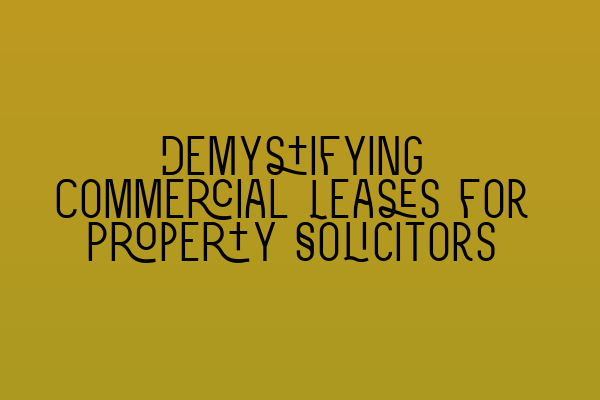Demystifying Commercial Leases for Property Solicitors
Welcome to the SQE Property Law & Land Law blog, where we aim to provide valuable insights and knowledge to property solicitors. In today’s article, we will be demystifying commercial leases, a topic that often presents challenges for both new and experienced solicitors in the field.
Understanding Commercial Leases
A commercial lease is a legally binding contract between a landlord and a tenant for the rental of a commercial property. It specifies the terms and conditions of the tenancy, including rent, duration, rights, obligations, and any additional provisions. Commercial leases are complex documents that require a solicitor’s expertise to navigate.
As a property solicitor, it is essential to have a solid understanding of the key elements of a commercial lease in order to provide proper guidance and representation to your clients. Let’s explore the essential aspects of a commercial lease in more detail:
1. Rent and Terms of Payment
The rent is a crucial component of a commercial lease and should be clearly outlined. It includes not only the base rent but also any additional charges, such as service charges, insurance, or maintenance fees. It’s essential to ensure that the rent terms are fair and reasonable for both parties.
To further enhance your knowledge on commercial lease rent terms, we recommend checking out our article on SQE 1 Practice Exam Questions.
2. Duration and Termination
The lease’s duration, also known as the term, specifies the period for which the tenant will have the right to occupy the property. It’s crucial to clarify the start and end dates of the lease, as well as any provisions for renewal or termination.
To dive deeper into the complexities of termination provisions, we recommend reading our detailed guide on SQE 1 Practice Mocks FLK1 FLK2.
3. Repair and Maintenance
Commercial leases often stipulate the tenant’s responsibilities for repairs and maintenance of the property. Understanding these obligations is vital to ensure both parties are clear on their respective roles and responsibilities.
If you’re looking for comprehensive guidance on repair and maintenance provisions in commercial leases, our SQE 2 Preparation Courses offer in-depth training on this topic.
4. Use and Restrictions
Commercial leases typically state the specific permitted use of the premises and any restrictions on activities. It’s crucial to carefully review these provisions to ensure they align with the client’s intended use of the property.
For more guidance on use and restriction provisions, our SQE 1 Preparation Courses provide valuable insights and practice materials.
5. Alienation and Assignments
In commercial leases, alienation refers to the ability of the tenant to assign or transfer the lease to another party. Understanding the terms and conditions surrounding alienation is crucial to protect your client’s rights and interests.
If you’re interested in staying up-to-date with the latest SRA SQE exam dates, be sure to check out our article on SRA SQE Exam Dates.
Conclusion
Commercial leases can indeed be complex, but with the right knowledge and expertise, they can be demystified. As a property solicitor, it is crucial to understand the intricacies of commercial leases to effectively represent your clients’ interests.
We hope that this article has shed some light on the key elements of commercial leases. For further resources and training to enhance your property law expertise, be sure to explore our comprehensive SQE preparation courses.
